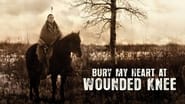Acensbart
Excellent but underrated film
SanEat
A film with more than the usual spoiler issues. Talking about it in any detail feels akin to handing you a gift-wrapped present and saying, "I hope you like it -- It's a thriller about a diabolical secret experiment."
Portia Hilton
Blistering performances.
Bumpy Chip
It’s not bad or unwatchable but despite the amplitude of the spectacle, the end result is underwhelming.
jacobjohntaylor1
This is an awful movie. My cousin Eric Schweig is actor who was in this movie and he did not like it. I do not blame him. It did not have a good story line. It is very slow and very depressing.
Julian R. White
I've studied the events that lead up to the Wounded knee massacre, and I have to say you have to give a hand to this film. They kept to the books for the most part, and 99% of the film is pretty much exactly what happened in real life. To understand that this happened in the year 1890 sure is disheartening, seeing as when you put it into a broad perspective, that wasn't that long ago. We all take for granted our core values and beliefs, and this film hits close to home. You feel empathy and heartbreak over what only one tribe of American Indians went through, you open your eyes to what happened to all of them as well.
paul2001sw-1
When the government of America's European settlers defeated the indigenous population, they didn't directly massacre or enslave them (at least, not in every case). The signed a treaty with the defeated Sioux that granted them land, and when they wanted some of this back, offered to pay for it. Senator Henry Dawes, architect of this deal, saw himself as a great friend on the Indians (as opposed to those who considered them sub-human); he was offering them civilisation. However, anthropologist Marvin Harris has suggested that the process of civilisation is not so much progress as a necessary adaptation to shortages of natural resources, especially land, and the truth of this is apparent when considering the Sioux; regardless of whether civilisation was truly in their interests, it was necessary to release their land to those who wished to exploit it. 'Bury My Heart At Wounded Knee' tells the story of this period, and the truth is grim and fascinating; but unfortunately, this is heavy-handed stuff, whose sympathies are always apparent, and marred by wooden acting and lumbering dialogue. In place of naturalism, almost every scene seems specially constructed to demonstrate a specific point of the history; and bizarrely, the story's natural climax is told, not as it happens, but in flashback, squandering the dramatic tension that should have been apparent. Yet in spite of its clumsiness, the film left me wanting to know more of the real history; in that at least it succeeds.
kimmo-tyyska
This horrifying flick seems to do its best in blurring and romanticizing events so much that way things actually happened becomes romanticed and messed. Which is of course the main reason of the movie. Characters doesn't show most anything from real people, the events are of course 'based on actual guideline', but there's just that something(a lot) which doesn't fit in (too much uncorrectness to mention). Somehow, the Indian characters seem more white that they should (as most are played by Indian) and somehow white characters seem more like bureacrates than actual officers and congressmen. And of course in most conversations them (w.a.s.p.) get the last word. And of course them victims (massacred) weren't saints themselves, and of course them religious movement was actually hoax, and of course all of it happened in more romantic times in distant past. And besides of all these things, the film is actually quite boring.Some credit goes to guidelines in the end of the movie, which at least seem to be correct.





